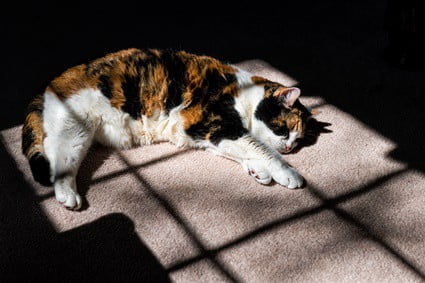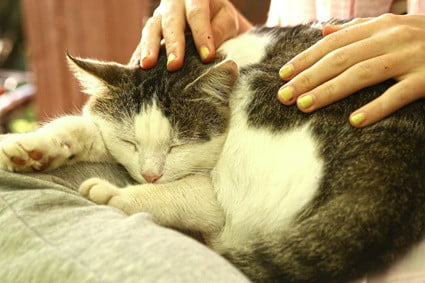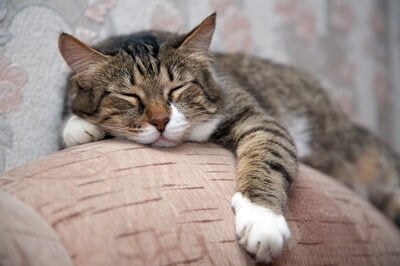Once a feline reaches senior status, it will spend far more of its daily life dozing. A cat that’s aged 11 years or older may spend up to 20 hours a day asleep. This is a perfectly normal way for elderly cats to recuperate.
A lifetime of hunting, jumping, and chasing takes a huge toll on a cat’s body. Sleep provides an opportunity for a senior cat to heal its aching bones, joints, and muscles. If an older cat is arthritic, resting is essential because movement will be more painful.
Feline movement requires the use of countless muscles in tandem, and a senior cat’s body doesn’t recover as fast as it once did. If your cat is healthy and acting normally, focus on making your cat’s bed comfortable and easily accessible.
Why Do Senior Cats Sleep All Day?
It will hardly come as a surprise that senior cats sleep most of the day. Even at the peak of health, cats spend most of their day resting. As mentioned, you should expect an old cat to sleep as much as 20 hours a day.
As long as the cat is otherwise happy and healthy, this is nothing to worry about. Do be mindful of your cat’s general behavior and demeanor, though. Your cat should be bright-eyed and bushy-tailed for the hours it is awake.
Even if you can’t see anything too concerning, consider the various explanations for your senior cat’s sleepiness. It may be natural, or your cat could have quality-of-life concerns that must be addressed. These include:
Exhaustion
Everyday life is tiring for a cat. Just walking requires the use of every muscle in a cat’s legs. Even young-and-vibrant cats only like to move if it is necessary, and they require regular naps.
What’s more, a cat is also always aware of its surroundings. Due to their excellent sense of hearing and smell, cats are always picking up on external stimuli. A cat’s whiskers also detect vibrations and changes to the air pressure.
This constant bombardment of information can take its toll on your cat’s body. After all that stimulation, just walking to the litter box may leave a cat feeling exhausted. Older cats have limited energy reserves and are easily drained. Sleep aids recovery, both mentally and physically.
Joint Repair
Excluding naps, cats have two main modes of sleeping. REM sleep sees a cat’s mind filtering through the day’s events. It is subconsciously deciding what memories are and aren’t important. It is during REM sleep that cats dream.
When not in REM sleep, cats enter deep sleep. This is a deep and dreamless slumber. It is critical for older cats, as this is when the body repairs itself. While a cat is in a deep sleep, aching joints get some welcome respite.
Sleep helps manage the discomfort of arthritis. If your cat gets enough rest, it will feel more capable of movement upon waking. Senior cats spend the majority of their day in deep sleep, not REM sleep.
Slower Digestion
It is common for cats to indulge in a long sleep after eating to aid the digestive process. Older cats struggle to digest traditional cat food, which could make your senior cat feel more sluggish and dozy after eating.
At your local pet store, you’ll find various senior-specific cat foods. Most reputable brands will provide these meals in flavors that your cats enjoy. Older cats should be fed an age-appropriate diet, so explore these options.
As per Topics in Companion Animal Medicine, elderly cats struggle to digest fats and carbohydrates. Food designed for older cats focuses on digestible proteins. Ergo, it does not sit as heavily in a cat’s stomach.
By switching your cat’s food, you may find that your cat is more energetic. Even if this is not the case, it will be significantly healthier. The cat’s digestive tract will find it easier to process this meal.

Hiding Illness or Vulnerability
Cats dislike revealing pain or illness, so an unwell cat would rather hide and sleep. Check your cat’s body language while it’s dozing. Does it adopt any of these happy and contented postures?
- On its side with all paws outstretched.
- On its back with belly exposed and claws retracted.
- On its front with paws tucked under the belly.
If so, your cat is unlikely to be in discomfort or feeling ill. These are the postures of happy, relaxed cats. If your cat is curled into a ball (the fetal position), this is the classic warning sign of pain. The cat may be trying to comfort itself.
If you notice this sleeping position, look for other behavioral changes. Does your cat reject handling? Has it lost interest in food or grooming? Is it uncharacteristically grumpy?
Loss of Hearing
As mentioned, older cats spend most of their day in deep sleep. However, if your cat is experiencing hearing difficulties, it will drift further into unplanned slumber as there is no noise to keep it awake and alert.
Test your cat’s hearing by making noises out of its line of vision. Avoid making noises, such as handclaps or stomping your feet. These will create vibrations that the cat’s whiskers detect, so you will no closer to knowing if your cat is deaf. Things that you can do include:
- Jangling car keys
- Using a training clicker
- Hissing
They will pique a cat’s interest if it hears them, but are not loud enough to distress the cat.
Boredom
There is always the possibility that a cat is sleeping due to boredom. If your cat has nothing better to do, it will sleep until something interesting happens. Cats start to slow down as they age, but they still need a little fun and entertainment to make life worthwhile.
Boredom is a dangerous path for cats to go down. Bored cats often become stressed and depressed, which leads to a loss of appetite. Boredom can also lead to destructive, attention-seeking behaviors.
Surround your cat’s territory with appropriate entertainment, such as toys, scratching posts, and climbing trees. There is every possibility that your cat will ignore these items. All the same, it will appreciate having them around and may use them on occasion.
Talk to your cat regularly as they enjoy interacting with their owners. If your cat is arthritic, it may miss the playtimes you once shared. Holding a conversation is the next best thing available.
Older Cat Sleeping Comfortably
Unless you have any reason to believe the cat is unwell, it’s completely natural for older cats to sleep for longer. In fact, you should focus on ensuring that your cat remains comfortable and gets as much rest as it likes. Here’s how:
Routine
All cats love routine, but senior cats are particularly keen on having structure. Remember, your cat will not spend as much time awake. Your cat needs to know when important things will happen.
Set an appropriate time for feeding each day and maintain it. Your cat will quickly start to build a body clock around this and will awaken in the early evening anticipating a meal.
If possible, add some exercise into your cat’s routine. This could be play or just basic physical movement. Senior cats frequently need to be coerced into moving, but it will help your cat sleep better later on.
Once your cat has exercised and eaten, offer it a hand with grooming. Exercise, food, and grooming are all precursors to a long, restful sleep. Encourage routine, and your cat will be relaxed enough to get some quality sleep.
Territory
A senior cat needs appropriate territory in which to sleep. The cat mustn’t be disturbed, so this area must remain quiet. Environmental factors must also be taking into consideration, such as the temperature.
A cat will often choose its own territory as they are strong-willed and largely do as they please. You can try to guide your cat into particular parts of the home, but older cats will naturally gravitate to quiet locations with soft furnishings and easy-access litter trays.
A spare room is an ideal location for a senior cat to sleep away the day. If this room has a window, avoid placing your cat’s bed directly under it, as this could create a draft. Set the thermostat to around 70 degrees Fahrenheit.
Beds And Blankets
A specialist bed will aid your cat’s sleep. As cats grow older and wearier, they struggle to access human furniture, and standard beds feel less comfortable.
With this in mind, get your cat a soft padded bed. The bed should be large enough for your cat to stretch but not so large that it dwarfs the cat. All cats like to feel snug and secure.
Ideally, choose a bed that is made entirely from soft material. If this is not possible, ensure that its plastic frame has at least one low side. The limited flexibility of senior cats must be accommodated.
Line the bed with familiar scents to tempt your cat to use it. Remember, your cat is going to sleep for most of the day anyway. If your cat snoozes in a warm, padded bed, it will be in a much better mood when t awakens.
Why Is My Cat Asleep All Day And Awake At Night?
Some owners complain that senior cats reserve their few waking hours for after dark. A reversed sleep-waking cycle can be frustrating. While cats may appear delicate and quiet, they can make noise after dark.
Most cats can be trained to sleep through the night. If your older cat has broken this training, there will be a lifestyle or medical explanation. Here’s how it can happen:
Lack of Routine
As discussed, senior cats prefer a reliable schedule. You may be inadvertently affecting your cat’s body clock.
Do not feed your cat its main meal during the day as it will always want to commence its main sleep after eating. Although most naps end in a deep sleep for senior cats, there are still varying rest levels.
If your cat gets lots of sleep during the day, it may wake up with a sudden burst of energy. This does not last long in senior cats, but it is enough to disturb your own rest.
You should also consider your cat’s surroundings during the day. It may find it easier to relax and sleep during the day when nobody is at home. This, again, will lead to activity by night. Carve out some quiet territory for your cat and re-train it to sleep at night.

Hyperthyroidism
Hyperthyroidism (thyrotoxicosis) is a common health concern in senior cats. As per the Journal of the American Veterinary Medical Association, age and the consumption of tinned foods are the most common cause.
Hyperthyroidism stems from the thyroid gland in the back of a cat’s neck. A hyperthyroid cat will produce an excess of hormones from this gland, called T3 and T4.
The thyroid glands impact a range of organs, so untreated hyperthyroidism can lead to secondary health concerns. Warning signs of hyperthyroidism include:
- Inexplicable weight loss, despite a healthy appetite
- Increased thirst and urination
- Lack of interest in grooming, leading to greasy and matted fur
- Vomiting and diarrhea
- Bursts of hyperactivity
It’s the latter symptom that can be linked most closely to hyperthyroidism. A cat may sleep all day but suddenly wake up and have a burst of energy. A hyperthyroid cat may hurt itself in a frenzy of activity and excitement.
Cognitive Dysfunction
If your cat is well into its dotage, cognitive decline becomes more likely. Your cat will struggle to think straight and will feel more confused, experiencing a steady deterioration of its mental faculties.
A senile cat will often have a reversed sleep-wake cycle. This means the few hours that the cat remains awake are likely to be after dark. As cats with FCD are often disoriented, your cat will likely wail and verbalize throughout this time. Other symptoms of FCD include:
- Eliminating outside the litter box
- Failing to recognize owners
- Behavioral shifts and mood swings
- Lethargy and lack of interest in surroundings
- Staring into space for prolonged periods
As explained by Veterinary Clinics: Small Animal Practice, FCD cannot be cured. The focus should be on slowing down the degradation of the brain. Allow your cat to sleep as much as it needs.
Once cats get older, they become less energetic. Unsurprisingly, a senior cat will spend the majority of its day sleeping. Just focus on keeping your cat comfortable (comfortable bedding, low-sided litter tray, reliable routine, etc.)


Hi. I have a 19 1/2 year old female cat who definitely sleeps most of the day. Does your 20 year old cat still get up to pee in the litter box or does she
/he just sleep on the cat bed & pee? My cat is doing this, so of course she sleeps on top of a pee pee pad. Ironically, she will go to the litter box & poop in front of the box or sometimes actually get in the box to poop. Just wondering….. Thanks!